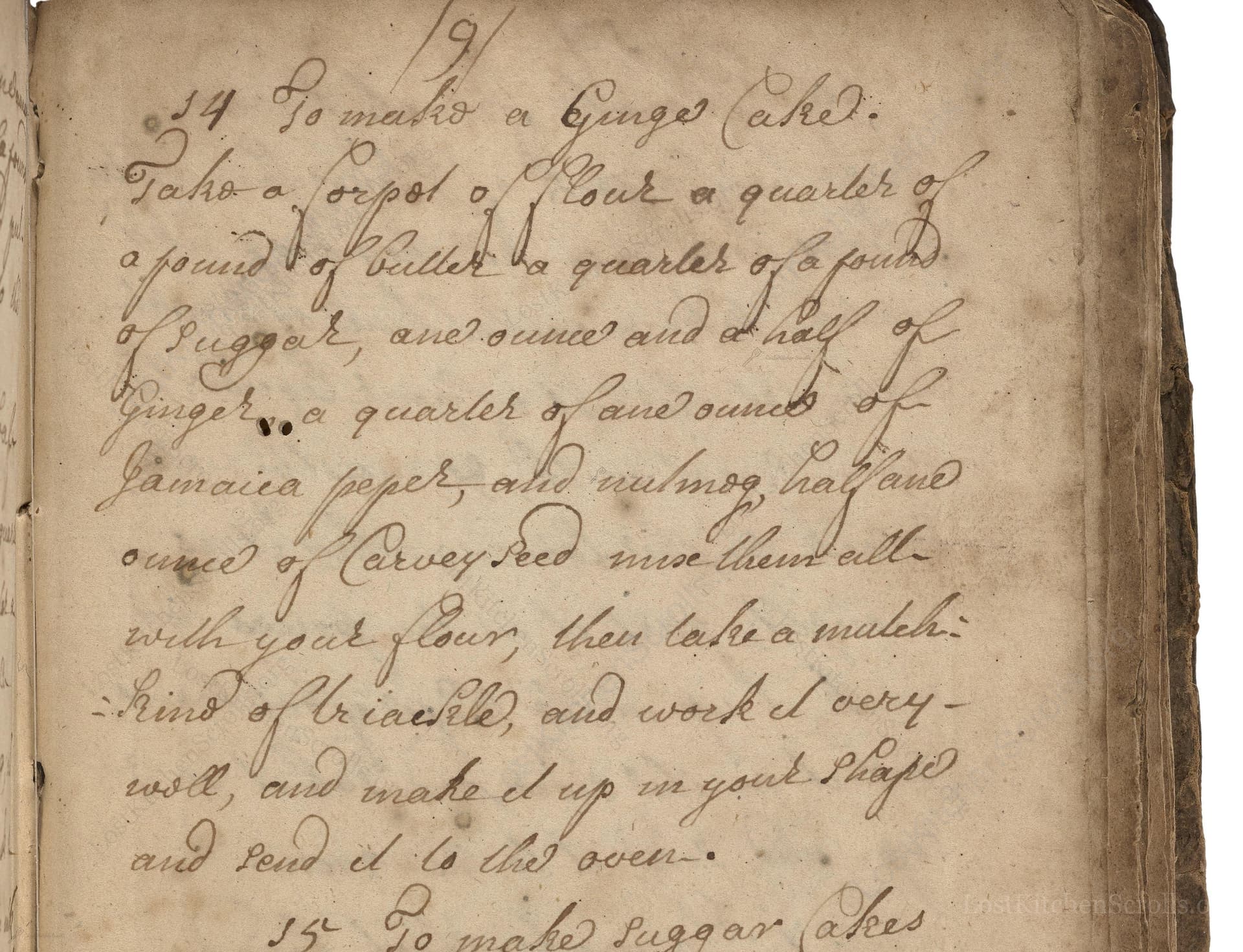To Make A Ginger Cake
From the treasured pages of Receipts for cookery and pastry work
Written by Mrs. Johnston

To Make A Ginger Cake
"Take a sorpet of Flour a quarter of a pound of Butter a quarter of a pound of Suggar, one ounce and a half of Ginger, a quarter of an ounce of Jamaica peper, and nutmeg, half an ounce of Carvey seed mix them all with your flour, then take a mulch-kind of treackle, and work it very-well, and make it up in your shape and send it to the oven."
Note on the Original Text
The recipe employs archaic spellings ('sorpet' likely meaning 'sort' or portion, 'mulch-kind' signifying a soft or sticky kind of treacle) and uses weights for even pungent spices—a sign of serious spice love! Steps are minimal and assume knowledge of how to blend, knead, and bake without explicit instruction, as was the norm. Quantities are more generous and robust than many modern recipes, reflecting period tastes and the absence of exact measuring tools.

Title
Receipts for cookery and pastry work (1700)
You can also click the book image above to peruse the original tome
Writer
Mrs. Johnston
Era
1700
Publisher
Unknown
Background
A delightful compilation of 18th-century recipes gathered by Mrs. Johnston herself, promising a charming journey through the flavors and culinary traditions of the early 1700s.
Kindly made available by
Folger Shakespeare Library
This recipe comes from the early 18th century, compiled around 1700 by Mrs. Johnston. At this time, gingerbread and ginger cakes were beloved throughout Britain, sold at fairs and in homes alike. Ingredients like caraway and Jamaica pepper reflect both the influence of global trade and the English fondness for robustly spiced baked goods. The generous use of ginger and treacle marks this out as a treat for cooler weather, likely baked in large batches to be enjoyed over several days. It captures the transition from 'medicinal' spiced cakes to sweet delights, emblematic of a period where home baking was both thrifty and indulgent.

In the early 1700s, bakers would have used sturdy wooden bowls to mix the dough by hand, often kneading directly on a scrubbed table. Scales were rare; judging by eye and feel was typical. The dough was likely shaped by hand or pressed into wooden molds for fancier patterns. Baking took place in wood-fired ovens with variable heat, so results depended on a baker's experience in reading their fire.
Prep Time
15 mins
Cook Time
25 mins
Servings
10
We've done our best to adapt this historical recipe for modern kitchens, but some details may still need refinement. We warmly welcome feedback from fellow cooks and culinary historians — your insights support the entire community!
Ingredients
- 1 3/4 cups plain flour
- 1/2 cup unsalted butter, softened
- 1/2 cup caster sugar
- 1/4 cup ground ginger
- 2 1/4 teaspoons ground allspice (substitute for Jamaica pepper)
- 3/4 teaspoon ground nutmeg (or freshly grated equivalent)
- 1 1/2 tablespoons caraway seeds
- 2/3 cup dark treacle (or molasses as substitute)
Instructions
- To recreate this 18th-century ginger cake in a modern kitchen, start by sifting about 1 3/4 cups of plain flour into a large mixing bowl.
- Add 1/2 cup each of unsalted butter (softened) and caster sugar.
- Measure out 1/4 cup of ground ginger—it's a bold punch!—then 2 1/4 teaspoons of ground allspice (as a substitute for 'Jamaica pepper') and a good grating of nutmeg, about a quarter of a whole nutmeg, or 3/4 teaspoon ground.
- Add 1 1/2 tablespoons of caraway seeds.
- Mix all these dry ingredients well.
- In the original, 'mulch-kind of treacle' likely refers to a robust, dark treacle—today, use about 2/3 cup of dark treacle (molasses).
- Gently warm the treacle so it mixes easily.
- Add the treacle to the dry mixture and work it in thoroughly, kneading lightly, just until it comes together into a soft, pliable dough.
- Shape the dough—roll it out and cut into rounds, or pat into a rustic loaf as you wish.
- Bake in a preheated oven at 350°F for about 20–25 minutes, or until just set but still moist.
- Cool before slicing.
Estimated Calories
280 per serving
Cooking Estimates
Making this ginger cake takes about 15 minutes to prepare your ingredients and workspace. Baking it in the oven then takes about 25 minutes. Once baked, each serving of the cake contains about 280 calories. This recipe makes around 10 generous slices or servings.
As noted above, we have made our best effort to translate and adapt this historical recipe for modern kitchens, taking into account ingredients nowadays, cooking techniques, measurements, and so on. However, historical recipes often contain assumptions that require interpretation.
We'd love for anyone to help improve these adaptations. Community contributions are highly welcome. If you have suggestions, corrections, or cooking tips based on your experience with this recipe, please share them below.
Join the Discussion
Rate This Recipe

Den Bockfisch In Einer Fleisch Suppen Zu Kochen
This recipe hails from a German manuscript cookbook compiled in 1696, a time whe...

Die Grieß Nudlen Zumachen
This recipe comes from a rather mysterious manuscript cookbook, penned anonymous...

Ein Boudain
This recipe comes from an anonymous German-language manuscript cookbook from 169...

Ein Gesaltzen Citroni
This recipe, dating from 1696, comes from an extensive anonymous German cookbook...
Browse our complete collection of time-honored recipes



